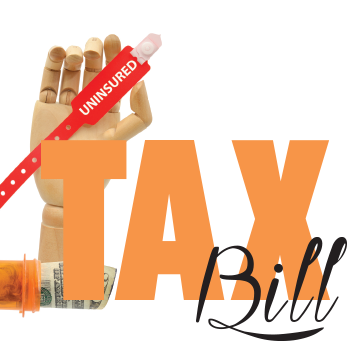
rSnapshotPhotos / SHUTTERSTOCK.COM
On Dec. 20, 2017, Congress passed a massive tax bill that will have an impact on nearly every individual and business in America. The bill makes sweeping revisions to existing tax provisions, and it will largely affect the health industry.
Individual Mandate Repealed
The bill repeals the individual mandate established in 2005 by the Affordable Care Act (ACA) by eliminating the penalty for failure to maintain health insurance coverage.
Under the ACA, the individual mandate requires Americans to carry a minimum level of health coverage unless they qualify for a hardship exemption. Failure to maintain coverage would result in a monetary penalty. The purpose of this mandate was to widen the insurance pools to establish a more representative class of insured, which includes young, old, healthy and sick individuals. Widening the pool was intended to reduce premiums through the idea that more people would be paying for coverage (instead of people enrolling only due to an illness and cancelling coverage once it is no longer needed), thereby reducing the overall cost of insurance.
It is anticipated that repealing the individual mandate will not affect most Americans because the majority of the population receives coverage through their employer or through a government program, such as Medicare, Medicaid, Tricare or the Civilian Health and Medical Program of the Uniformed Services (CHAMPUS). However, those individuals who obtain coverage through private insurance markets will likely face higher premiums as a result of the repeal. Experts project the higher premiums will destabilize the individual market and cause the number of uninsured Americans to rise.
The Congressional Budget Office (CBO) stated that approximately 4 million fewer people will have health insurance coverage in the first year the repeal is effective. This number would rise to 13 million by 2027. In addition to the rising number of uninsured individuals, the CBO expects premiums to rise approximately 10% each year of the first decade of the repeal.
As a result, some insurers will likely drop out of the market. Industry and consumer groups have expressed their concern with the repeal. The American Academy of Actuaries called the mandate an “integral component” of the ACA, because it “helps encourage the young and healthy, as well as the old and sick, to obtain coverage, thus achieving the balanced risk pool required to keep premiums affordable and stable.” As a result, “insurers would likely reconsider their future participation in the market. This could lead to severe market disruption and loss of coverage among individual market enrollees.”
Individuals who obtain health coverage through private insurance markets will likely face higher premiums as a result of the repeal of the individual mandate. Experts project that these higher premiums will destabilize the individual market & cause the number of uninsured Americans to rise.
Impact on Providers
Providers will certainly be negatively affected by the mandate’s repeal. When individuals opt out of insurance coverage, they will be less inclined to seek medical assistance when needed. This reduction in office visits will directly affect provider income because there will be fewer encounters resulting in reimbursable claims. It is worth noting, however, that those individuals who opt out of insurance coverage are likely to be those who do not have an urgent need for healthcare, and the hope is that provider reimbursement will not be negatively impacted too drastically, as many of the soon-to-be uninsured individuals would likely not be visiting medical professionals frequently due to the fact that they are generally in good health.
All other provisions of the ACA, such as the prohibition on discriminating against people with preexisting conditions, remain intact for now.
 Steven M. Harris, Esq., is a nationally recognized health-care attorney and a member of the law firm McDonald Hopkins LLC. Contact him via email at [email protected].
Steven M. Harris, Esq., is a nationally recognized health-care attorney and a member of the law firm McDonald Hopkins LLC. Contact him via email at [email protected].